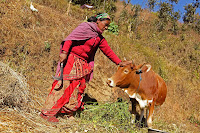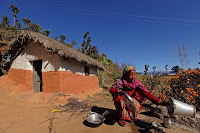by Shreya Thapa
Sitting outside her home, Radhika Dhakal surveys the stretch of land directly below her. Verdant plumes emerge from the earth and the soil extending from the house to the main road is a patchwork of brown and green.
“When we started, I didn’t think any of this would be possible,” she says in a soft, almost distant, voice.
“The cooperative didn’t have a lot of money at first. Each woman contributed Rs 20 per month,” Radhika says. “When we had a small collection, the cooperative was ready to make the first loan.”
The system is simple: When a sizeable fund is collected, each member is at liberty to petition for a loan. Depending on the circumstances of the women, a decision is made, often based on whose need is the most urgent. Beyond loans, the coop also guides members on agricultural matters from tools to farming tips and trainings to optimizing production.
“They were considering giving the money to another lady and I knew if I didn’t get it then, I would have to wait longer for the next opportunity.” Some of the cooperative members were hesitant to give Radhika the first loan, seeing as she had no means of earning. But she convinced them she would pay it back within two months.
The sum she had sought was a modest Rs 2,600 but it was enough to make significant changes in her life.
“At that time, I didn’t even have a house. We lived in a hut made from sticks. But with my first loan, I was able to make a house for my family.”
“Having our own land made this all possible… from there we were able to move up,” she says.
With a combination of her earnings and more loans, Radhika has been able to acquire a cow. Her excitement of being able to make such a purchase is almost tangible, her voice grows louder as she points to where the cow is tethered. And the same sense of fulfillment is evident when she mentions the new roadside stall she recently opened.
Originally published in República newspaper
Sitting outside her home, Radhika Dhakal surveys the stretch of land directly below her. Verdant plumes emerge from the earth and the soil extending from the house to the main road is a patchwork of brown and green.
 |
| ©IFAD/Rocky Prajapati |
At 42, Radhika and her husband have their own house, and more importantly, their own land in the mountain village of Gurase in the mid-western district of Dailekh. On the six ropani (about a third of a hectare) that is registered in her name, the couple farm vegetables such as cauliflower, potato, cabbage and radish, enabling them to make between Rs 100,000 and Rs150,000 in a year. They recently bought a cow, and a few months ago, Radhika opened a small roadside stall.
“We’ve come a long way,” she says with a satisfied smile.
Less than a decade ago, the couple and their five children lived under very different circumstances.
“Back then, we used to chop wood and sell it,” Radhika explains about the labor-intensive jobs with minimal pay she and her family endured in the past. “We had to work for other people, sometimes carrying supplies from Surkhet to Dailekh (approximately 24 km), which would take all day. It was very difficult. We had no income and because of that, it was nearly impossible to get a loan from anywhere. If we somehow got a loan, the interest rate would be impossibly high.”
 |
| ©IFAD/Rocky Prajapati |
So Radhika – along with 12 other women in Gurase – took matters into her own hands by establishing the Ama Shristhi Savings and Credit Cooperative. The cooperative is a part of the Western Upland Poverty Alleviation Project supported by the International Fund for Agricultural Development (IFAD). Across 11 districts in western Nepal, the project works with the Government of Nepal to promote resilient livelihoods and offers dignity to poor and socially disadvantaged groups, especially women, Dalits, Janjatis, and as Radhika once was – the landless.
“The cooperative didn’t have a lot of money at first. Each woman contributed Rs 20 per month,” Radhika says. “When we had a small collection, the cooperative was ready to make the first loan.”
The system is simple: When a sizeable fund is collected, each member is at liberty to petition for a loan. Depending on the circumstances of the women, a decision is made, often based on whose need is the most urgent. Beyond loans, the coop also guides members on agricultural matters from tools to farming tips and trainings to optimizing production.
“They were considering giving the money to another lady and I knew if I didn’t get it then, I would have to wait longer for the next opportunity.” Some of the cooperative members were hesitant to give Radhika the first loan, seeing as she had no means of earning. But she convinced them she would pay it back within two months.
The sum she had sought was a modest Rs 2,600 but it was enough to make significant changes in her life.
“At that time, I didn’t even have a house. We lived in a hut made from sticks. But with my first loan, I was able to make a house for my family.”
While the house still stands strong today, the first loan laid a foundation for a better future. “After paying back my loan in full, I was able to earn the trust of the cooperative,” she says, and in doing so, she was able to take out more loans.
 |
| ©IFAD/Rocky Prajapati |
Eight years ago, Radhika used a loan to clear the land that was part of her inheritance, “When I got the land, it was useless –mostly jungle –and you couldn’t farm on it. We didn’t even know if we could farm it and make a living out of it but we really wanted to change our lives. We know what hunger is, we suffered so much, and seeing how others were doing it, I wanted to farm, too.”
And she did. With the vegetables she plants and sells, Radhika is able to rely on consistent income every season. “This earning makes a huge difference. My husband has always been sickly and was never able to work or earn properly,” she explains how the vegetables dramatically changed her family’s situation.
By having a reliable means of earning, Radhika and her family have a burden lifted from their backs—they no longer need to leave the house at 4 am only to return at 8 pm after carrying dokos of vegetables and rice between Surkhet and Dailekh. On top of having the workload eased, Radhika has earned stability for her family by being able to educate all of her children, a remarkable feat especially considering she never went to school and only recently learnt to write her name from a fellow coop member.
With a combination of her earnings and more loans, Radhika has been able to acquire a cow. Her excitement of being able to make such a purchase is almost tangible, her voice grows louder as she points to where the cow is tethered. And the same sense of fulfillment is evident when she mentions the new roadside stall she recently opened.
 |
| ©IFAD/Rocky Prajapati |
“We’ve come a long way, but I believe we can do more, and I want to do more,” she exclaims.
The positive impact the cooperative has had on her life and other members is undeniable, but the women aren’t looking to limit themselves. “Until now we’ve only done farming, but I would like to learn tailoring to make clothes,” Radhika says, adding, “I wouldn’t mind learning how to knit or make stools, as we don’t have any of these trades in Gurase.”
Already quite busy, Radhika isn’t daunted by how more responsibilities would come with new ventures. She and the other women from the cooperative are eager to work together and share the workload. By learning different trades Radhika is looking out for the next generation, too. “If we can do this, then after we learn we can teach our children too,” she adds.
Less than 10 years ago, Radhika didn’t know where her next meal would come from. Now, through the income she makes from farming, she’s in a place to look ahead. “Now after having accomplished all this, we want to do more, we can think more long-term and plan for the future,” she says.
Originally published in República newspaper